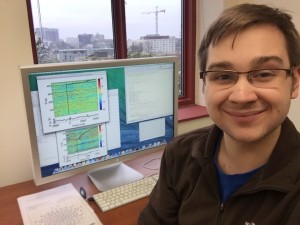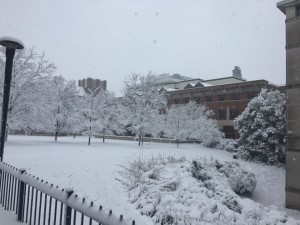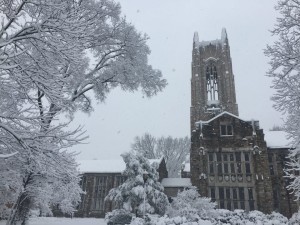
Matt Broschard ’16: Research Observer in Dr. Sean Polyn’s Computational Memory Lab at Vanderbilt University and Ivey Psychological Science Student research award recipient from Gustavus Adolphus College.
Matt Broschard ’16, a Psychological Science major, was a Research Observer in Dr. Sean Polyn’s Computational Memory Lab at Vanderbilt University in Nashville, TN. Broschard ’16 was supported in this endeavor with an award from the Ivey Psychological Science Student research fund from Gustavus Adolphus College. His main project was analyzing data for an EEG experiment on human memory. Additionally, he observed the course “Human Memory” taught by Dr. Polyn, collecting data using fMRI equipment, and developing his programming skills. Broschard hopes to continue this work for his Independent Study course entitled, “The Neurobiology of Memory and Cognition” with Dr. Michael Ferragamo. Additionally, Broschard has met new connections and facilitated his graduate school application at Vanderbilt University by demonstrating his research abilities.
Broschard describes his recent research experience:
“I got connected with this opportunity simply by emailing professors. Last summer during my grad school search, I was emailing labs that looked interesting seeing if they were accepting grad students. I knew that I wanted to gain a research experience outside of Gustavus to understand how a larger University conducts research, so on those emails, I added that I would be free during January to help out in their lab. This is how I found Dr. Sean Polyn’s Computational Memory Lab at Vanderbilt University. Dr. Polyn uses neuroimaging techniques like fMRI and EEG to observe and understand how we remember. With this data, their lab develops computational models that act to mimic this data. So ultimately, when a person is given the task of memorizing a list of random words, this model attempts to predict which words within that list will be remembered and in which order. This model can then be used to further theorize the mechanisms of memory.
I am a Research Observer in this lab. Because I am only here for four weeks, it is hard to develop my own experiment. Instead, I have spent my time understanding the current projects in the lab, developing my programming skills, going to faculty talks, meeting with professors, and overall getting a sense of what kinds of research are being conducted at Vanderbilt.
My main research project has been analyzing an electroencephalography (EEG) dataset from a free recall experiment. Using Independent Component Analysis (ICA), which separates ERP waveforms into smaller components, it is possible to determine which components are extra noise due to eye blinks or muscle movements. This technique allows these unwanted components to be eliminated from the overall waveform, so that when reconstructed, the data is much cleaner.
Research opportunities at Gustavus has provided excellent tools that I have incorporated in my experience here. Working with Dr. Lauren Hecht in her Perception and Attention lab has led to further research opportunities like the Gordon A. Braatz Psychological Science Research Grant and the Presidential Faculty Student Collaboration Grants for me to develop my research skills. Working in Dr. Mark Kruger’s Social Neuroscience lab exposed me to EEG, techniques that I have used in my Psychological Science Honors project and here at Vanderbilt.
My advice for incoming students interested in science is to start early. Gustavus provides a great environment to develop strong connections with professors. Take advantage of this. Meet with professors outside of class to talk about their research and how to get involved. Developing research experience early with pay off as you progress through college. It will only open more doors and will give you a better sense of what researching is all about. Additionally, I encourage students to take diverse classes outside of their major. For one, this is what the liberal arts is all about, incorporating schools of thought and different perspectives to create a more holistic understanding of that topic. It also shows ambition and flexibility as a candidate for future work. Case and point, this lab includes a lot of mathematical modeling. By taking extra math courses outside of my Psychology and Biology majors, I have the basic building blocks to work in this lab and develop new skills.”

Vanderbilt University in Nashville, TN; photo by Matt Broschard ’16
